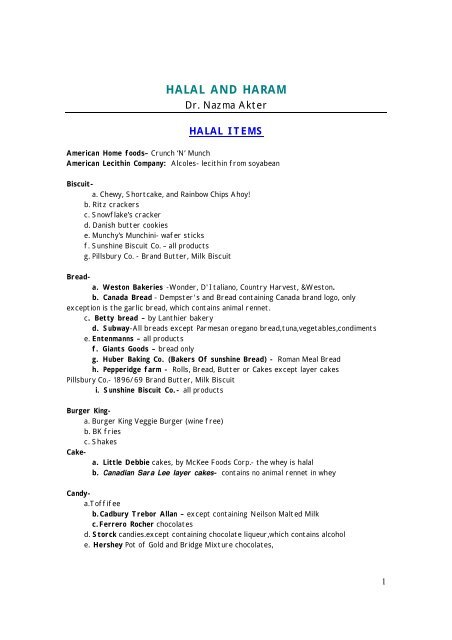
In today’s multicultural landscape, it is becoming more important for food service managers to understand the different dietary practices followed by Americans. Population continues to grow and diversify, religious dietary restrictions, such as kosher and halal, are increasingly followed. During the last decade, the market for kosher food has increased by 15% on a yearly basis in North America. Similarly, halal food is also experiencing strong growth.
Halal Certified Food Many foods are clearly Halal or clearly Haram. However, certain foods are difficult to classify because of the ingredients they contain.
Halal consumers now spend $20 billion on food each year in the United States. Strict laws and regulations governing these two types of diets outline what foods a person can and cannot eat and how to prepare them.
To help understand these religious practices, each diet will be examined in greater depth. The Kosher Diet Food is kosher when it meets dietary requirements outlined by Jewish law or kashrut, making it acceptable for people observing those laws to eat. The role of a kosher supervisor is to ensure the food is kosher and remains kosher after preparation or processing. A kosher symbol on a food product means that the product has been certified kosher from an agency.
Kosher food is divided into three groups: meat, dairy and pareve (neither meat nor dairy). Only animals that chew their cud, have cloven hooves and are free from disease are considered kosher. These restrictions also apply to animal flesh, organs, milk and any by-products.
Domesticated fowl are considered kosher. Seafood with fins and scales are also allowed. According to Jewish law, meat and dairy products cannot be combined or eaten at the same meal. Many people wait between three to six hours after eating a meal containing meat to have dairy products. Pareve foods do not contain any meat or dairy, therefore they can be eaten with either one. Examples of foods allowed: • Meat: Kosher beef, game, lamb, chicken, turkey, duck, goose and fish • Dairy: Products Milk, cheese, yogurt (from a kosher certified animal) • Parve Fruits, vegetables, eggs, fish*, cereal products, nuts, grains *Fish cannot be placed on the same plate as meat – however, it can be consumed during the same meal. Examples of forbidden foods: • Pork, reptiles, amphibians and insects • Shellfish (including lobster, oysters, mussels), shrimp and scallops • Animal products or by-products made from any non-certified animal The Halal Diet Islamic dietary laws define which foods are halal.
Halal foods are lawful and permitted to be eaten by those observing Islamic teachings. Muslims are not allowed to consume foods or beverages that are Haram, or forbidden. Foods that carry a halal symbol on their packaging have been approved by an agency and are certified to be free of any forbidden components or ingredients. Halal claims on the nutrition label or the packaging must include the name of the certification body.
Baker’s Yeast Extract (Halal) Flavouring agent obtained from Baker’s Yeast cells. Baking Powder (Halal) Baking powder is a dry chemical leavening agent, a mixture of a carbonate or bicarbonate and a weak acid, and is used for increasing the volume and lightening the texture of baked goods. Baking Soda (Halal) Also known as bread soda, cooking soda, and bicarbonate of soda.

Sodium bicarbonate, referred to as baking soda, is primarily used in baking, as a leavening agent. Balsamic Vinegar (Doubtful) Traditional balsamic vinegar is produced from the juice of just-harvested white grapes (typically, Trebbiano grapes) boiled down to approximately 30% of the original volume to create a concentrate or must, which is then fermented with a slow aging process which concentrates the flavours. The flavour intensifies over the years, with the vinegar being stored in wooden casks, becoming sweet, viscous and very concentrated. During this period, a portion evaporates: it is said that this is the “angels’ share”, a term also used in the production of bourbon whiskey, scotch whisky, wine, and other alcoholic beverages. Commercial-grade balsamic vinegar is used in salad dressings, dips, marinades, reductions, and sauces.
The reason why this vinegar is doubtful is because Alcohol/wine maybe introduced in the process of manufacturing it. Basil (Halal) Plant based spice. Also called great basil or Saint-Joseph’s-wort, is a culinary herb of the family Lamiaceae (mints). It is also called the “king of herbs” and the “royal herb”. Bay Leaves (Halal) Bay leaf (plural bay leaves) refers to the aromatic leaves of several plants used in cooking. Beer (Haram) Alcoholic drink. Beer Batters (Haram) Beer is a popular ingredient in batters used to coat foods before frying.
The purpose of using beer is so the bubbles in the beer will add body and lightness to the batter. Beer batter is not permissible as is contains Beer as an ingredient which is haram. Beer Flavor (Haram) Contains beer. Kak otmotatj schetchik transformatorom.